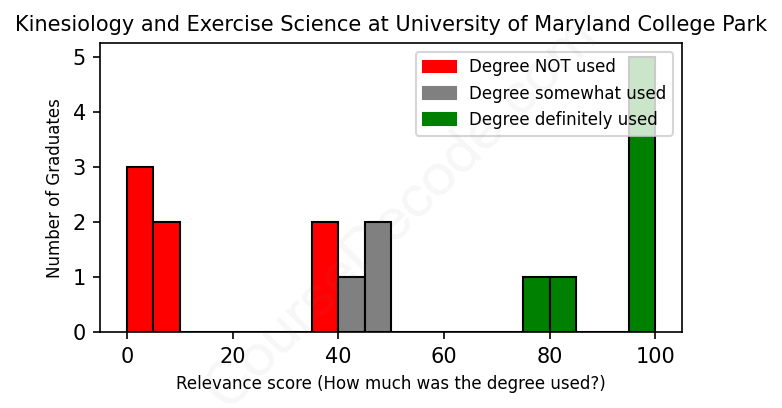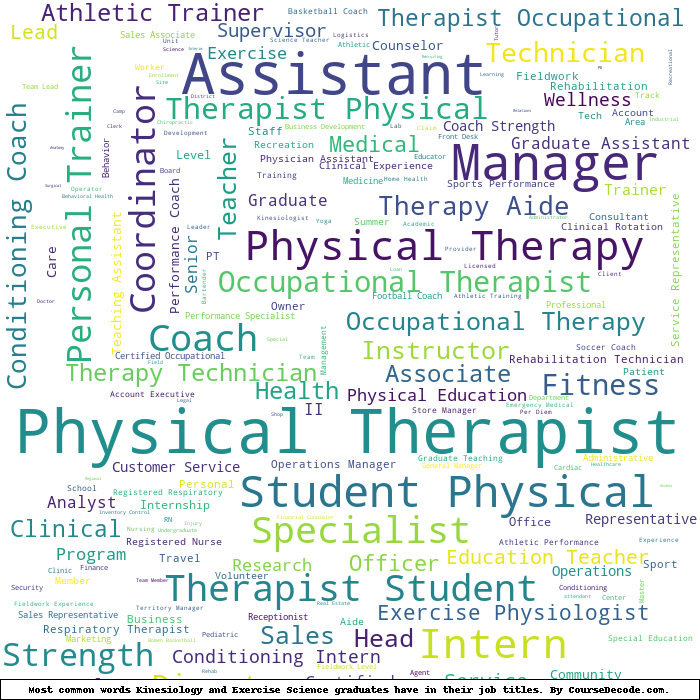
First, some facts. Of the Kinesiology and Exercise Science graduates from University of Maryland College Park we've analyzed , here's how many have used (or NOT used) their degree in their career:

These are estimates based on AI analysis of 17 LinkedIn profiles (see below).
The verdict? Significantly below average. Overall, with an average relevance score of 52%, Kinesiology and Exercise Science graduates from University of Maryland College Park have a much lower likelihood (-15%) of finding work in this field compared to the average graduate across all fields:
And for comparison, here's the chart for all profiles we've looked at across all degrees.
Also, after graduating, 64% of these graduates have pursued further education other than another Bachelor's degree (such as a Masters degree or other), compared to the average across all profiles of 35%. This suggests you may need more than just a Bachelors degree to be competitive as a Kinesiology and Exercise Science graduate.
See the details:
|
Relevance score: 100% We think this person has gone into a career highly relevant to their degree. We think this person has gone into a career highly relevant to their degree.
DEGREE INFOGraduated in 2018 from University of Maryland College Park with a Bachelor's degree in Kinesiology and Exercise Science. No other secondary education since. JOB HISTORY SINCE GRADUATIONProfessional Fitness Coach Excellence in Fitness Apr 2018 - Apr 2018 Professional Fitness Coach  Excellence In Fitness Personal Training Studios Apr 2018 - Jul 2020 ABOUTNo information provided. |
The top 10 most common jobs done by the graduates we've analyzed (ranked most common to least) are:
When looking through the job profiles of graduates from the University of Maryland College Park with degrees in Kinesiology and Exercise Science, a clear trend emerges. Many of these individuals have pursued careers in fields directly relevant to their studies, especially in areas like physical therapy, occupational therapy, and personal training. These professions utilize the principles of human movement, rehabilitation techniques, and exercise science that are central to their degrees. For instance, roles like Physical Therapist, Occupational Therapist, and Personal Trainer are frequently listed, which all necessitate a deep understanding of anatomy, biomechanics, and the principles of effective exercise and fitness.
However, not all graduates have taken positions that relate closely to their educational background. Many have found themselves in roles like business administration, sales, or even software development—careers that don't leverage the unique skills and knowledge acquired in their Kinesiology and Exercise Science programs. While some jobs may include transferable skills or indirect connections to the degree, many positions seem tangential at best. Overall, while there are numerous examples of graduates successfully launching careers in fields closely aligned with Kinesiology and Exercise Science, there's also a significant portion who have ventured into unrelated areas, reflecting a diverse range of career paths following their education.
Here is a visual representation of the most common words in job titles for Kinesiology and Exercise Science graduates (this is across all Kinesiology and Exercise Science graduates we've analyzed, not just those who went to University of Maryland College Park):

Graduates from the University of Maryland College Park with degrees in Kinesiology and Exercise Science generally pursue a variety of career paths that often align with their field of study. In their early careers, many of these alumni seem to gravitate towards hands-on roles such as physical therapy aides, medical assistants, and personal trainers. These positions allow them to gain practical experience and skills that are directly related to their education, often paving the way for them to become licensed professionals in fields like physical therapy or occupational therapy. Over time, we see a significant number of these graduates progressing into higher-level roles, such as licensed physical therapists and occupational therapists, demonstrating a clear trajectory towards careers in health and rehabilitative services.
However, it's also important to note that not every graduate sticks to a career in Kinesiology and Exercise Science. Some end up in less related fields, such as sales, education, and even software development. For instance, a few graduates transitioned into business roles or teaching, which suggests that while many maintain relevance to their degree, others take a different route. Overall, those who remain in the health and fitness realm generally find fulfilling careers that capitalize on their expertise, while others who move away from their field may experience a different kind of career satisfaction, although it may not directly utilize their Kinesiology background. So, while there are indeed successful trajectories for many, the path varies based on individual interests and opportunities encountered after graduation.
Honestly, a Bachelor’s degree in Kinesiology and Exercise Science can be a bit of a mixed bag—it’s not super easy, but it’s also not the hardest degree out there. At places like the University of Maryland College Park, you'll definitely have to dig into some science courses, especially in anatomy, physiology, and nutrition, which can be challenging if you're not really into science. Plus, you'll often have practical components and group projects that can be a bit time-consuming. However, if you love staying active and are genuinely interested in how the body works, it can be really engaging and fun. So, while it requires effort and commitment, if you're passionate about it, you'll probably find it more enjoyable than a grind!
Most commonly, in the LinkedIn profiles we've looked at, it takes people 4 years to finish a Bachelor degree in Kinesiology and Exercise Science.
Looking at the job history of these Kinesiology and Exercise Science grads from the University of Maryland, it seems like some of them have found decent opportunities, especially those who went into fields like occupational therapy and physical therapy, which typically pay well. For example, the Occupational Therapist with a solid track record has their own practice now, which usually leads to better income. However, others, like the sales and training roles, might not be raking in as much cash, since they often pay less than healthcare professions. Overall, it looks like if you stick with the healthcare side of things, you're more likely to make a comfy living, while those in less specialized roles might not be doing as well financially. So, if you’re eyeing those higher paychecks, aiming for a solid career in healthcare could be the way to go!
Here is a visual representation of the most common words seen in the "about" section of LinkedIn profiles who have a Bachelor degree in Kinesiology and Exercise Science (this is across all Kinesiology and Exercise Science graduates we've analyzed, not just those who went to University of Maryland College Park). This may or may not be useful:

Here are all colleges offering a Bachelor degree in Kinesiology and Exercise Science (ordered by the average relevance score of their Kinesiology and Exercise Science graduates, best to worst) where we have analyzed at least 10 of their graduates: